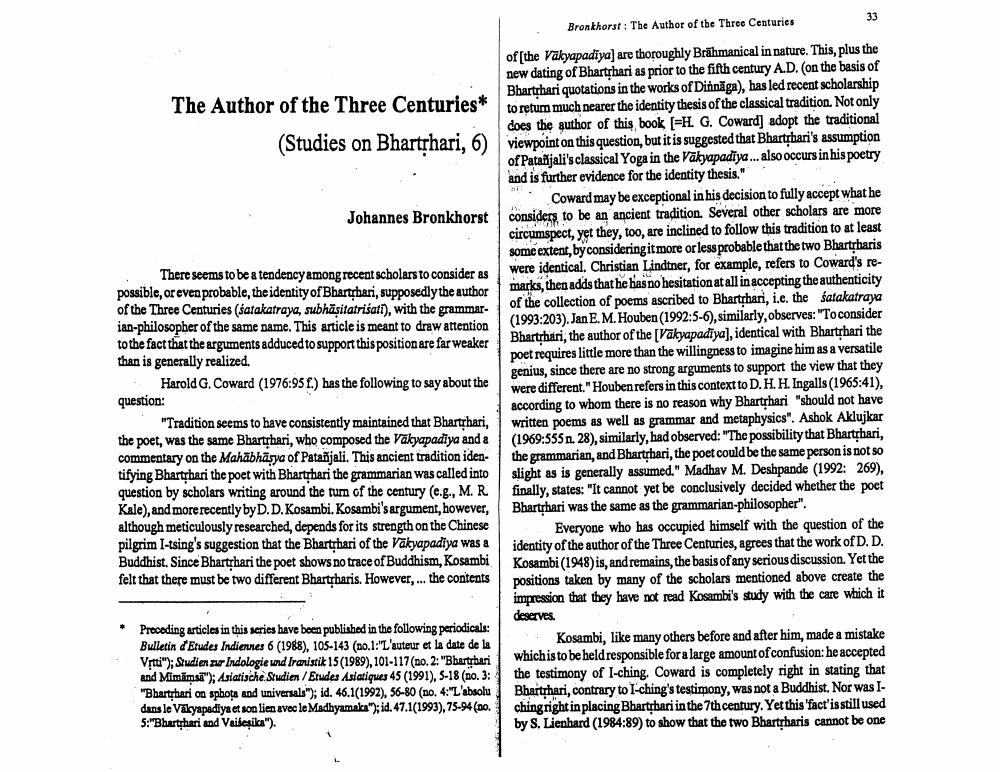Book Title: Author Of Three Centuries Author(s): Johannes Bronkhorst Publisher: Johannes Bronkhorst View full book textPage 1
________________ The Author of the Three Centuries* (Studies on Bharthari, 6) There seems to be a tendency among recent scholars to consider as possible, or even probable, the identity of Bharthari, supposedly the author of the Three Centuries (satakatraya, subhāṣitatrisati), with the grammarian-philosopher of the same name. This article is meant to draw attention to the fact that the arguments adduced to support this position are far weaker than is generally realized. Harold G. Coward (1976:95 f.) has the following to say about the question: "Tradition seems to have consistently maintained that Bhartṛhari, the poet, was the same Bharthari, who composed the Vakyapadiya and a commentary on the Mahabhasya of Patanjali. This ancient tradition identifying Bhartṛhari the poet with Bharthari the grammarian was called into question by scholars writing around the turn of the century (e.g., M. R. Kale), and more recently by D. D. Kosambi, Kosambi's argument, however, although meticulously researched, depends for its strength on the Chinese pilgrim I-tsing's suggestion that the Bharthari of the Vakyapadiya was a Buddhist. Since Bhartṛhari the poet shows no trace of Buddhism, Kosambi felt that there must be two different Bhartṛharis. However, ... the contents 33 Coward may be exceptional in his decision to fully accept what he Johannes Bronkhorst considers to be an ancient tradition. Several other scholars are more circumspect, yet they, too, are inclined to follow this tradition to at least some extent, by considering it more or less probable that the two Bhartṛharis were identical. Christian Lindtner, for example, refers to Coward's remarks, then adds that he has no hesitation at all in accepting the authenticity of the collection of poems ascribed to Bharthari, i.e. the śatakatraya (1993:203). Jan E. M. Houben (1992:5-6), similarly, observes: "To consider Bharthari, the author of the [Vakyapadiya], identical with Bhartṛhari the poet requires little more than the willingness to imagine him as a versatile genius, since there are no strong arguments to support the view that they were different." Houben refers in this context to D. H. H. Ingalls (1965:41), according to whom there is no reason why Bhartṛhari "should not have written poems as well as grammar and metaphysics". Ashok Aklujkar (1969:555 n. 28), similarly, had observed: "The possibility that Bhartṛhari, the grammarian, and Bhartṛhari, the poet could be the same person is not so slight as is generally assumed." Madhav M. Deshpande (1992: 269), finally, states: "It cannot yet be conclusively decided whether the poet Bharthari was the same as the grammarian-philosopher". Preceding articles in this series have been published in the following periodicals: Bulletin d'Etudes Indiennes 6 (1988), 105-143 (no.1:"L'auteur et la date de la Vitti"); Studien zur Indologie und Iranistik 15 (1989), 101-117 (no. 2: "Bharthari and Mimamsa"); Asiatische Studien / Etudes Asiatiques 45 (1991), 5-18 (no. 3: "Bharthari on sphota and universals"); id. 46.1(1992), 56-80 (no. 4:"L'absolu dans le Vakyapadiya et son lien avec le Madhyamaka"); id. 47.1(1993), 75-94 (no. 5:"Bharthari and Vaiseṣika"). Bronkhorst: The Author of the Three Centuries of [the Vakyapadiya] are thoroughly Brahmanical in nature. This, plus the new dating of Bhartṛhari as prior to the fifth century A.D. (on the basis of Bharthari quotations in the works of Dinnaga), has led recent scholarship to return much nearer the identity thesis of the classical tradition. Not only does the author of this book [=H. G. Coward] adopt the traditional viewpoint on this question, but it is suggested that Bhat's assumption of Patanjali's classical Yoga in the Vakyapadiya... also occurs in his poetry and is further evidence for the identity thesis." Everyone who has occupied himself with the question of the identity of the author of the Three Centuries, agrees that the work of D. D. Kosambi (1948) is, and remains, the basis of any serious discussion. Yet the positions taken by many of the scholars mentioned above create the impression that they have not read Kosambi's study with the care which it deserves. Kosambi, like many others before and after him, made a mistake which is to be held responsible for a large amount of confusion: he accepted the testimony of I-ching. Coward is completely right in stating that Bharthari, contrary to I-ching's testimony, was not a Buddhist. Nor was Iching right in placing Bharthari in the 7th century. Yet this 'fact' is still used by S. Lienhard (1984:89) to show that the two Bhartṛharis cannot be onePage Navigation
1 2 3 4 5
